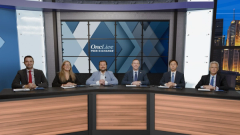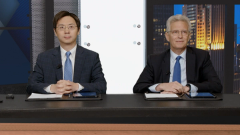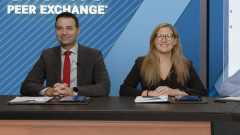
Relapsed/Refractory DLBCL: Managing Patients on CAR T-Cell Therapy
A brief review of what one can expect while managing a patient with relapsed/refractory diffuse large B-cell lymphoma on CAR T-cell therapy.
Episodes in this series

Transcript:
Matthew A. Lunning, DO, FACP: Dr Rhodes, we went around what the spectrum of the patient population that could get cellular therapy. You talked about your ICU [intensive care unit] patient. Are you doing anything prophylactically to re-try to risk mitigate those high-grade ICANS [immune effector cell-associated neurotoxicity syndrome] and CRS [cytokine release syndrome] events?
Joanna M. Rhodes, MD, MSCE: Yes. One of the great things is that as we’ve had CAR-T cells around longer we have a better understanding of managing the toxicities that are involved. When CAR-T cells were first used in patients with ALL [acute lymphoblastic leukemia], no one knew what this was and how to manage it. Then the question was, is the CRS event, is that necessary for a response? We now know it’s not. The fact that we can now move our prophylactic medications, our tocilizumab [Actemra], our steroids, our ICANS up for earlier [treatment] and have a little bit more, are able to use them appropriately early on, we can mitigate some of the grade 3 and 4 events. We’ve seen that in the data in subsequent CAR T-cell trials, that we are seeing less grade 3 and 4 CRS than we were in the initial studies.
Matthew A. Lunning, DO, FACP: Are you upfront having this curative intent, noncurative intent pathway type of discussion in the second line, or are you utilizing your first-line experience in tailoring the discussion based upon how they did with their first-line therapy?
Joanna M. Rhodes, MD, MSCE: I think how patients tolerate R-CHOP [rituximab (Rituxan), cyclophosphamide, doxorubicin, vincristine, and prednisone] tells you a lot about who they are. That’s an important thing to think about. If someone has poor tolerance to R-CHOP and I’ve either stopped early or I’ve had to dose reduce and go down to R-mini-CHOP, that may be someone that doing CAR T-cell might be a little bit more challenging. I don’t think it takes it off the table, but it’s something to consider and you must have that discussion with each patient. I sort of agree, I look at whether I think someone is truly curative intent or not. Patients that have an ICAN performance status of 3 or 4, and that’s their baseline before they get lymphoma, those are patients that I know curative intent treatment may not be the right thing for.
Matthew A. Lunning, DO, FACP: Dr Saeed, just a little comment on your management strategy in reducing cytokine release syndrome, ICANS. Do you have a set regimen across constructs, or is it construct specific?
Hayder M. Saeed, MD: No. But we implement earlier intervention basically than where we were concerned before about using steroid or toci [tocilizumab] earlier in the treatment of CRS. Now if we feel the patient, depending on the way though they were entered into the CAR-T pathway, whether ferritin, inflammatory markers, bulk of their disease, then if we feel that those patients will have high risk of CRS, we intervene earlier, whether once they start having the initial symptoms of CRS. I think at this point, after few years managing the CAR-T cells, in general there’s better experience, better guidelines to follow how to manage those patients and the outcome is improving gradually.
Transcript edited for clarity.








































